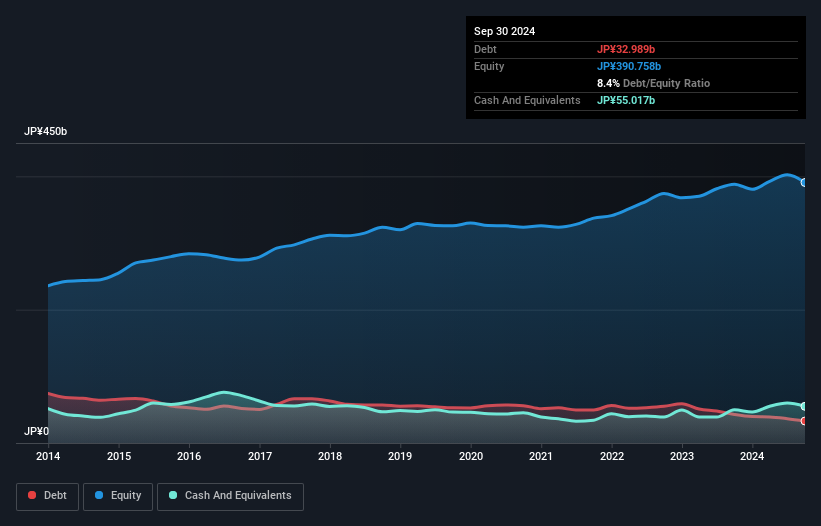Warren Buffett famously said, 'Volatility is far from synonymous with risk.' It's only natural to consider a company's balance sheet when you examine how risky it is, since debt is often involved when a business collapses. We note that Nippon Shokubai Co., Ltd. (TSE:4114) does have debt on its balance sheet. But should shareholders be worried about its use of debt?
When Is Debt A Problem?
Debt is a tool to help businesses grow, but if a business is incapable of paying off its lenders, then it exists at their mercy. If things get really bad, the lenders can take control of the business. However, a more usual (but still expensive) situation is where a company must dilute shareholders at a cheap share price simply to get debt under control. Of course, plenty of companies use debt to fund growth, without any negative consequences. When we think about a company's use of debt, we first look at cash and debt together.
View our latest analysis for Nippon Shokubai
How Much Debt Does Nippon Shokubai Carry?
As you can see below, Nippon Shokubai had JP¥33.0b of debt at September 2024, down from JP¥42.8b a year prior. But it also has JP¥55.0b in cash to offset that, meaning it has JP¥22.0b net cash.

How Strong Is Nippon Shokubai's Balance Sheet?
We can see from the most recent balance sheet that Nippon Shokubai had liabilities of JP¥85.4b falling due within a year, and liabilities of JP¥46.5b due beyond that. On the other hand, it had cash of JP¥55.0b and JP¥92.1b worth of receivables due within a year. So it actually has JP¥15.1b more liquid assets than total liabilities.
This short term liquidity is a sign that Nippon Shokubai could probably pay off its debt with ease, as its balance sheet is far from stretched. Simply put, the fact that Nippon Shokubai has more cash than debt is arguably a good indication that it can manage its debt safely.
Fortunately, Nippon Shokubai grew its EBIT by 7.8% in the last year, making that debt load look even more manageable. When analysing debt levels, the balance sheet is the obvious place to start. But ultimately the future profitability of the business will decide if Nippon Shokubai can strengthen its balance sheet over time. So if you want to see what the professionals think, you might find this free report on analyst profit forecasts to be interesting.
Finally, a company can only pay off debt with cold hard cash, not accounting profits. Nippon Shokubai may have net cash on the balance sheet, but it is still interesting to look at how well the business converts its earnings before interest and tax (EBIT) to free cash flow, because that will influence both its need for, and its capacity to manage debt. Happily for any shareholders, Nippon Shokubai actually produced more free cash flow than EBIT over the last three years. That sort of strong cash conversion gets us as excited as the crowd when the beat drops at a Daft Punk concert.
Summing Up
While we empathize with investors who find debt concerning, you should keep in mind that Nippon Shokubai has net cash of JP¥22.0b, as well as more liquid assets than liabilities. And it impressed us with free cash flow of JP¥24b, being 116% of its EBIT. So we don't think Nippon Shokubai's use of debt is risky. Another positive for shareholders is that it pays dividends. So if you like receiving those dividend payments, check Nippon Shokubai's dividend history, without delay!
At the end of the day, it's often better to focus on companies that are free from net debt. You can access our special list of such companies (all with a track record of profit growth). It's free.
Valuation is complex, but we're here to simplify it.
Discover if Nippon Shokubai might be undervalued or overvalued with our detailed analysis, featuring fair value estimates, potential risks, dividends, insider trades, and its financial condition.
Access Free AnalysisHave feedback on this article? Concerned about the content? Get in touch with us directly. Alternatively, email editorial-team (at) simplywallst.com.
This article by Simply Wall St is general in nature. We provide commentary based on historical data and analyst forecasts only using an unbiased methodology and our articles are not intended to be financial advice. It does not constitute a recommendation to buy or sell any stock, and does not take account of your objectives, or your financial situation. We aim to bring you long-term focused analysis driven by fundamental data. Note that our analysis may not factor in the latest price-sensitive company announcements or qualitative material. Simply Wall St has no position in any stocks mentioned.
About TSE:4114
Nippon Shokubai
Engages in the manufacture and sale of chemical products in Japan and internationally.
Flawless balance sheet with solid track record and pays a dividend.
Similar Companies
Market Insights
Community Narratives


Recently Updated Narratives

Astor Enerji will surge with a fair value of $140.43 in the next 3 years

Proximus: The State-Backed Backup Plan with 7% Gross Yield and 15% Currency Upside.

CEO: We are winners in the long term in the AI world
Popular Narratives


MicroVision will explode future revenue by 380.37% with a vision towards success


The company that turned a verb into a global necessity and basically runs the modern internet, digital ads, smartphones, maps, and AI.



